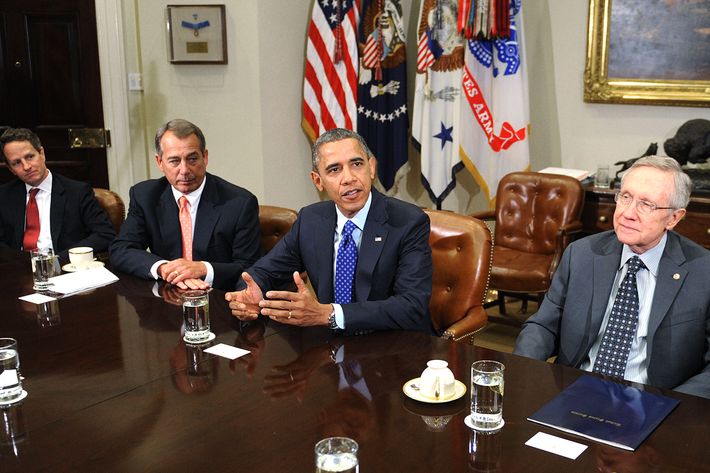
The hot Republican apocalyptic summer threat, shutting down the federal government until President Obama agrees to abolish the Affordable Care Act, has been dying a slow death, which is now semiofficial. House Speaker John Boehner officially informed his caucus he’s going to try next month to pass a “continuing resolution” to keep the federal government running. But the basic dynamic remains in place: When the strategic starting point of your internal debate is a comically ambitious Bond-villain-style threat, even the fallback plan is going to wind up very, very far out there.
Begin with the starting point: Boehner’s hope to pass a continuing resolution. Boehner is not going to include a demand to defund Obamacare, but he will rearrange federal spending in a way that protects Republican priorities while imposing deep cuts on Democratic priorities. It’s not clear if he can manage to find a compromise with President Obama and Senate Democrats that can also pass muster with his own party. It’s not even clear if he can find 218 votes to pass a continuing resolution that just his own party likes, as a negotiating starting point. This sort of chaos has occurred over and over again. So even if Boehner isn’t trying to shut down the government, he may wind up watching it happen by accident.
Next, in order to talk ultraconservatives out of their Obamacare shutdown threat, House leaders are promising to hold the debt ceiling hostage instead. (“House Majority Leader Eric Cantor (R., Va.) emphasized the potential for Republicans to use the debt-ceiling talks later this fall to extract concessions from the president,” reports The Wall Street Journal.) This is a vastly more dangerous threat: A short-term shutdown would have little economic impact, but a debt default could have a potentially catastrophic impact.
The Republican leadership is perfectly aware that a debt default could have explosive implications and that the Obama administration is not willing to negotiate over it. It’s already formulating a line of retreat to back out of this threat. As Politico reports, they want to tie together negotiations over the debt ceiling with negotiations over budget sequestration. Then they can extract concessions from Obama on the budget and sell them to their base as a ransom for lifting the debt ceiling, rather than admit they just gave in on the debt ceiling.
It’s a clever idea and not completely unworkable. But the trouble is that it assumes Republicans can extract the kinds of concessions from Obama on the budget that their base desires without giving anything in return. This is highly unlikely and gets at the strangeness of Republican thinking about sequestration. The basic design of it was to create a set of automatic policies that would be badly designed and disproportionately painful to both sides, to force them to negotiate a mutually acceptable long-term deficit-reduction plan.
The word Republicans keep using on sequestration is leverage — they have leverage over Obama because Obama hates sequestration. It’s true. Obama wants to replace sequestration with a mix of longer-term, revenue-raising tax reform and cuts to retirement programs. But that sort of meet-in-the-middle compromise, which he included in his most recent budget, is a million miles away from what Republicans are demanding. House Republicans want to trade away sequestration for a delay in Obamacare, which they openly say would be used to force more delays, ultimately preventing the law from ever having a chance to be implemented.
The less extreme Republican sequestration plan is to try to get Obama to cut Social Security and Medicare with no additional revenue, in exchange for lifting sequestration. I highly doubt Obama, who even in his surrender-iest moments in 2011 refused to cut those programs without revenue, would go for a deal like that. Even if he somehow would, Democrats in Congress wouldn’t.

In any case, the basic premise of the sequestration deal seems to have little appeal to Republicans at all. This passage, from the New York Times’ account of the budget impasse, is incredibly alarming:
Senators Corker, Isakson and John Hoeven of North Dakota have adamantly rejected that, saying they could never cancel spending cuts now for more gradual but less certain cuts stretched over a decade.
Trading cuts now for cuts later is the entire premise of the sequestration setup. We don’t have an immediate budget problem. The deficit right now is, objectively, shrinking extremely fast. Indeed it’s shrinking too fast, creating an anti-stimulus that’s keeping unemployment high. We do probably have a long-term budget gap. The win-win deal would involve postponing the dumb, immediate cuts and replacing them with long-term cuts.
But if Republicans are going to insist that long-term cuts are fake, and the only real cuts are the ones that happen now, then the entire premise for a possible agreement collapses. And these are the deal-cutting Republicans we’re talking about, the ones Obama has the best chance of getting and who probably couldn’t help pass anything through the House anyway.
If there’s no deal on sequestration, how do the House Republican leaders convince their members to lift the debt ceiling? You can only placate irrational people with impossible future promises for so long.






























